As a registered nurse who experienced her own life-changing neck injury, Abi Schnell has developed an empathetic heart that will serve her well in her future as a midwife. Abi’s love of people and adventure has taken her to a study abroad in Jerusalem, an internship in Fiji where she spearheaded an evaluation of the country’s women’s health programs, and backpacking in Alaska and Mexico. Through it all, Abi has sought guidance from the spirit and found confidence in following her own unique path.
Tell me a little bit about yourself.
I’m originally from Pittsburgh, Pennsylvania, and lived there most of my life. My dad is a doctor and my mom is going back to school for social work. I have five siblings—three sisters and one brother. I went to Brigham Young University for my undergraduate in public health and I minored in international development. I specialized in health promotion, and chose to specialize even further in women’s health.
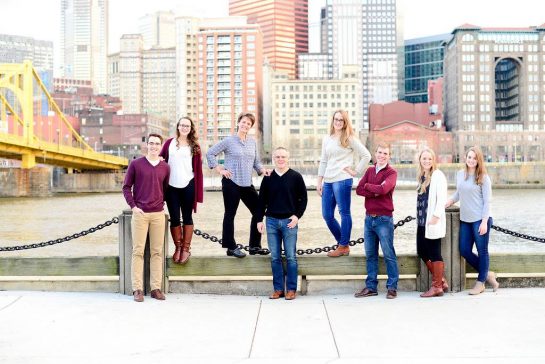
Abi with her family
My husband, Ryan, and I met at the end of my degree as we were both applying for master’s programs. He had gotten into the University of Chicago, and I at Brigham Young. As we prayed about it we got the answer that we needed to pursue his degree, so we moved to Chicago three months after getting married. I quickly realized you can’t really get a job with a bachelor’s degree in public health, so I thought about trying for a master’s degree again. I had done my undergrad internship in Fiji and gotten a chance to work closely with nurses and I loved what they did and the care that they offered. On a whim, I applied for the University of Illinois just because it was where I was and it was an in-state school. It offered a Master’s of Science in Nursing, which is what I was really interested in. I just barely finished my program in December, and passed my boards exam! So I am officially a registered nurse!
What’s your plan from here?
My plan is to apply to midwifery school next fall and then become a midwife.
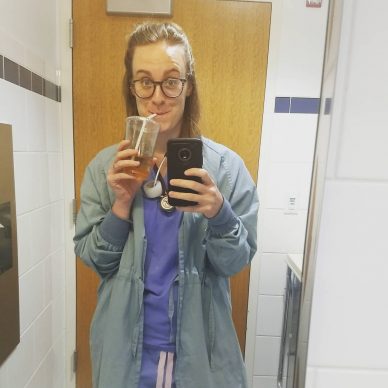
Abi took this photo of herself at work the night she first knew that God’s calling for her was to be a labor and delivery nurse, and midwife.
When did you first know you wanted to pursue a career in medicine?
My dad really loves what he does. I was always inspired by how much he loved his job, but also by how much he loved his family. I could always see he was torn between loving going to work and loving coming home. He wanted to be in both places at once. My dad really got me into health. I became more interested in women’s health in college. It just fit. I never felt like there was an exact, specific moment where I thought I really want to do women’s health. It just fell into my lap. I also feel like it was the Holy Ghost and Heavenly Father leading me towards this path. He knew this was exactly what I needed to do and steered me that way. I’ve always loved it.
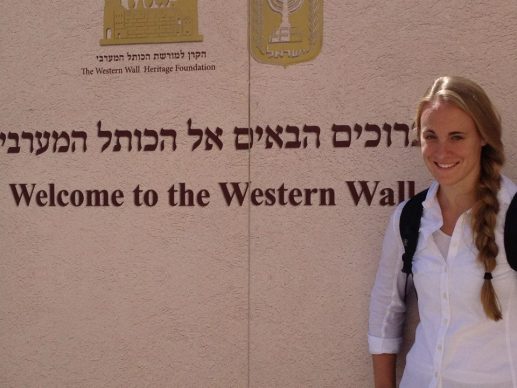
Abi at the Western Wall
Could you tell me about your internship in Fiji?
I interned in Fiji with Help International which is a great organization. They send college students to countries around the world. They give you the contacts you need within different organizations and the government. Then you run with it.
In Fiji, they had a contact in the Ministry of Health who helped me set up a meeting with the Director of Nursing for the country. She is in charge of all the nurses for the country of Fiji. I sat down for my meeting with her and I don’t think she even knew who I was, or what I was doing there. I had just taken an evaluation methods class at BYU , so I told her I would love to evaluate one of their programs. She looked at me like I was crazy and said they needed all of their programs evaluated, so I could pick a program and run with it. I told her I was interested in women’s health, so she connected me with the people I needed to talk to and work with.
I spent the summer creating an evaluation of their women’s health programs that were run through hospitals, nurses’ stations, and health centers. I gave myself a crash course in excel coding and made a huge evaluation spreadsheet. After I was done creating it using all their protocols and guidelines, I went and visited a couple of places to pilot test it. By the end of the summer, I visited about twenty different sites. I went through their books and supplies to see what they needed and what they had. At the end of the summer I calculated everything and took it back to the Ministry of Health. I told them where they were doing a good job and where there was room for improvement to help their nurses succeed. I don’t know if they used the evaluation, but I hope they did. It was a big undertaking. I didn’t realize how much I bit off until I was in the middle of it all.
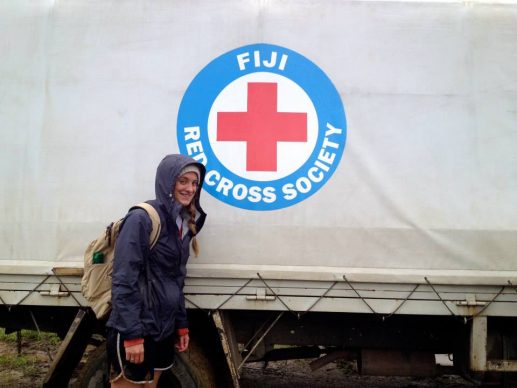
Abi completing her internship in Fiji
Do you feel like your time evaluating the different programs helped you with nursing school?
The whole point of public health is to try and create a big picture and find simple solutions for hard problems related to health. They do that by collecting a lot of data and creating basic programs to solve the problems. This was difficult in a place like Fiji where nurses didn’t have the equipment they needed and sometimes even lacked electricity or running water. The public health officials were trying to solve problems like diabetes and other things like that. They put programs in place and made the nurses pick up the programs. Unfortunately, the nurses can’t worry about the problems if they don’t have running water or electricity to have light during the night. There wasn’t a lot of talking to each other, but a lot of talking at each other.
There are a lot of problems with nursing in the United States, but my time in Fiji humbled me to realize that I have things very easy here. It gave me a reality check for what nursing is like everywhere else in the world. It helped me recognize how public health and nursing work together, but also make things harder for each other. It’s important to try and make them mesh rather than fight against each other.
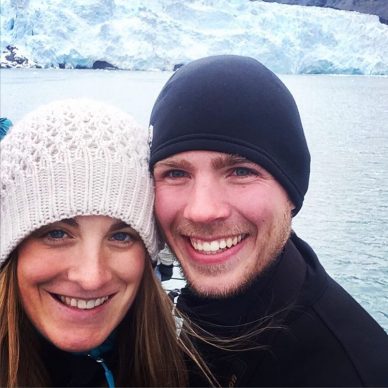
Abi and her husband Ryan
I understand you broke your neck in college. Could tell me about that and how it happened?
I broke my neck in October of 2013 at BYU’s True Blue Festival during homecoming week. I was a junior. There was a giant slip n slide covered in blue foam. I dove down the hill and when I got to the bottom I thought I had whiplash. I didn’t think I had broken my neck. I went down the slide again and I walked home. My neck was really stiff. I took a shower and was in a lot of pain. I thought I just needed to sleep it off. But then, while I was in the shower I could hear the bones cracking in my neck and I thought that maybe that was a bad sign. I got out of the shower and called my dad. I asked, “If I can hear the bones cracking in my neck, should I go to the hospital?” He said I should definitely go.
I had a friend drive me to the ER. There were a lot of people there from the True Blue Festival. I guess I didn’t describe the pain right, because they thought I had a concussion. I went back and they decided to do a CT scan to rule out any problems. I was waiting for them to realize that something was really wrong with me, and then I heard my nurse running down the hall. The nurse came in with a neck brace and told me, “Don’t move a muscle. We’re going to put this on you and then the surgeon will come and talk you.” I fractured my C-2 vertebrae. I honestly was very lucky, and was only in the hospital for a week.
How did your recovery impact you and your nursing education?
Because my dad was a doctor, they let me fly home instead of staying in the hospital or going to a short-term rehabilitation center. I went home for three months and dropped out of school for that semester. It was miserable. It was the worst three months of my life. I spent a lot of time feeling sorry for myself. My dad tried the hard love way of saying, “I have patients who have had similar injuries who are completely paralyzed, so you should be grateful.” It would stick for a day and then I would feel sorry for myself again. My mom sat down with me one day. I think she knew that I eventually was going to be a nurse or something similar. She said, “this is your chance to really empathize with your patients. This is an enormous amount of pain you are going through and how many providers can say that they have gone through that same amount of pain and come out on the other side?” I really took that to heart.
When I moved to Chicago I got a job at the Shirley Ryan Ability Lab. Which is one of the best rehab hospitals in the country. I worked all over the hospital, but I took care of a lot of patients who had similar brakes to mine. Some were paralyzed. I have a special place in my heart for people who have to wear cervical collars (a type of brace you wear when you break your neck). They are very uncomfortable and your neck is always in pain.
One time, I had a girl who really wanted to take a shower, but the chair we had for her to take a shower in didn’t have a head rest. It required that she hold her head up, but she had a brace on and all of her muscles were healing from the surgery she had. She was in a lot of pain. She wanted to shower and she didn’t want to lie down during the shower. She was very unhappy. I ran around the hospital trying to figure out how to make it work for her. I couldn’t find a chair with a headrest on it and so I ended up finding some really long shoe horns. I took those and I taped them to the chair. I taped a towel between them. I made a jerry-rigged headrest for her. It was fulfilling that I could help her take shower. It was such a small thing, but taking a shower is one of the greatest things you can do when you are in the hospital. Being able to give that to her and understanding how important that was to her was really big.
I think that my experience helps my relationship with patients. My mom was right, that experience gave me a large supply of empathy that I feel enables me to love my patients on a whole other level.
What was your physical therapy experience like? How much function have you regained?
I did a year of physical therapy, about 3-4 times a week for a few months and then I went down to once a week. I’ve gotten back 50% of my rotation right to left and that’s about it. It’s hard, but I’ve learned to cope.
My internship in Fiji was after the break. When I went to Fiji it was kind of like telling myself that being who I wanted to be—which is very adventurous and outgoing—was possible even after I broke my neck. It was important to prove to myself, my parents, and to everybody that I was capable of doing whatever I wanted to do in spite of this. It felt really great.
What are some of the adventuresome and outgoing things you’ve done since then?
Since then, I have free-dived to 75 feet without scuba gear. I have climbed 17,000 feet in Mexico. I backpacked across 40 miles of Alaskan wilderness. I have traveled everywhere and anywhere I want to go. I lift patients every day. I rock climb all the time with my husband. My one rule after I broke my neck was that if I was going to survive, I would never let that stop me from doing what I wanted to do in my life.
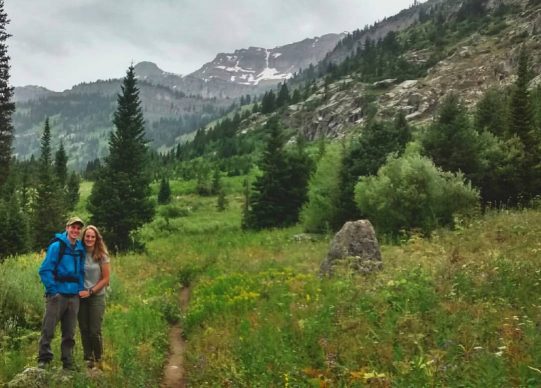
Abi and her husband Ryan
Do you feel like you’ve seen God’s hand in your life as you’ve made career decisions and moved through your neck injury?
Definitely. I feel like every decision about school, marriage, and career choices have been guided. If you told me that I would be where I am today when I was 17, I would not have believed it, but it is exactly what I have needed in my life. I feel like Heavenly Father and Mother know me so much better than myself and they know exactly what I need. I’ve tried to be open to letting both of them influence my life as much as possible and to being willing to do what they need me to do.
Is there anything else you want to add?
Don’t let anyone tell you how to believe or what to believe. Your path is different from everyone else’s. You can model it after anyone you want, but eventually it will become your own. Over time, I’ve had a lot of people tell me that the path I’m taking is the wrong path. Being able to trust that I’m following whatever Heavenly Father has asked me to do helps me feel confident with my path. So long as you feel that you are doing what Heavenly Father has asked you to do, then don’t let anyone tell you any differently.
At A Glance
Name: Abi Schnell
Age : 25
Location: New York City, NY
Marital History: Married 4 years
Occupation: Registered Nurse
Schools Attended: Brigham Young University (BS-Public Health) and University of Illinois at Chicago (MSN)
Languages Spoken at Home: I only speak English with some high school Spanish, but I have a personal goal to speak Arabic
Favorite Hymn: Each Life that Touches Ours for Good
Interview Produced by Anne Leishman Merrell
